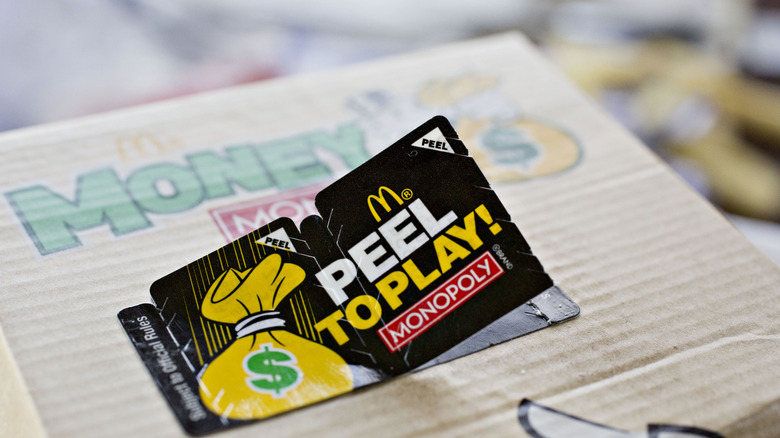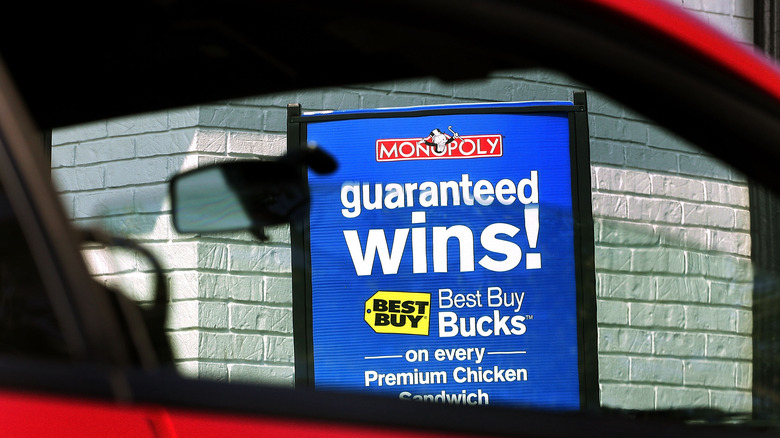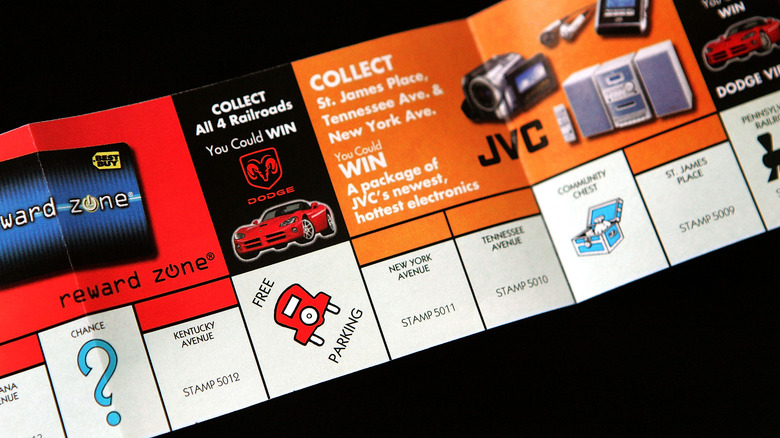The Million Dollar Scam Hidden Behind McDonald's Monopoly Game
Correction 1/17/2023: A previous version of this article stated the September 11 attacks on the US happened in 2011. The event occurred in 2001.
You've played it once or twice mostly for the fun of it, not expecting to win anything big. If you're lucky, the most you won is a voucher for free fries or a Quarter Pounder the next time you swung by your local McDonald's. The game we're talking about is McDonald's Monopoly, a promotional game where you peel stickers off drink cups to see if you won a fabulous prize.
The story of McDonald's Monopoly begins in 1987, when commercials featured McDonald's customers trading McDLT and Coca-Cola for game pieces. The commercials promised extravagant rewards in free food and millions of dollars. It wasn't until the 1990s that the Monopoly game began to evolve, according to Insider, including more prizes and even a cross-country train tour to donate books to children across the nation. Some, such as Talon.One, have even gone on to praise McDonald's Monopoly as a "masterclass in promotions." High praise for a game that has you peeling stickers off your container of large fries.
Yet like any game of chance, be it blackjack, slots, poker, or McDonald's Monopoly, someone with a particularly clever knowledge of how the game works can easily "fix" it to get the results they want. But how can someone fix McDonald's Monopoly, considering all it is basically stickers on cups and containers? The story of one of the most bizarre scams in fast-food history involves crooked cops, con men, and an FBI sting — a plot so outlandish all it needed was the Grimace.
The scam was lead by a former security director
The story of the "McMillions" scam begins as all good schemes do: inside a bathroom. In a stall, a man feverishly opens a packet of stickers, dumps them into his hand, then refills the packet with seemingly identical stickers. This man is Jerome "Jerry" Jacobson, a former security director for Simon Marketing, and he's switching out winning Monopoly pieces for himself to distribute to "lucky winners" — for a price.
As CNBC explains, Jacobson's job at Simon Marketing was to deliver the winning prize stickers in a sealed tamper-proof case to McDonald's packaging centers, where he would then apply the stickers to containers sent for chosen McDonald's locations. It was only when Jacobson received a package of seals by accident from the supplier, giving him a way to open the cases and then reseal them. This meant Jacobson could remove the winning prize pieces, put non-winning pieces in, and then seal the case to deliver them as usual.
With winning tickets in hand, Jacobson and his gang of recruits would sell the pieces to anyone who would be willing to pay upfront, using everyone from conmen to his own family members to sell the prizes. At one point, Jacobson even donated a million-dollar winning piece to St. Jude's Children's Hospital — presumably as a way to get a lighter sentence if he was caught (via CNN).
For nearly a decade, Jacobson seemed to have McDonald's in the palm of his hand.
The FBI caught on to Jacobson in 2000
While Jacobson and his team of swindlers and recruiters may have been raking in the dough for a good period of the 1990s, the money train would soon come to a screeching halt at the beginning of the 2000s.
According to Insider, the FBI, following an anonymous tip, began the groundwork of "Operation: Final Answer" to bust up the Monopoly crime ring. This involved tracing thousands of phone calls, tracking supposed "winners," and wiretapping Jacobson's phone line. It was only in 2001 that Jacobson and 50 other accomplices were arrested and charged with mail fraud and conspiracy, with Jacobson receiving three years in prison and a fine of $12.5 million in restitution. The trial, however, started on September 10, 2001 — a day before the September 11 attacks, and the resulting national tragedy ultimately swept the scandal under the rug.
As for McDonald's, while the scam was a great loss of money to be sure, it seems that it hasn't dissuaded the company from doing the Monopoly promotion. While The U.S. Sun says that no Monopoly games have been held in the United States following the scandal, perhaps as a result of the scam, McDonald's Monopoly is still run in the United Kingdom and Canada. But who knows? Maybe one day Americans can peel stickers off their Coke cups and see if they're taking a walk on the boardwalk again.


